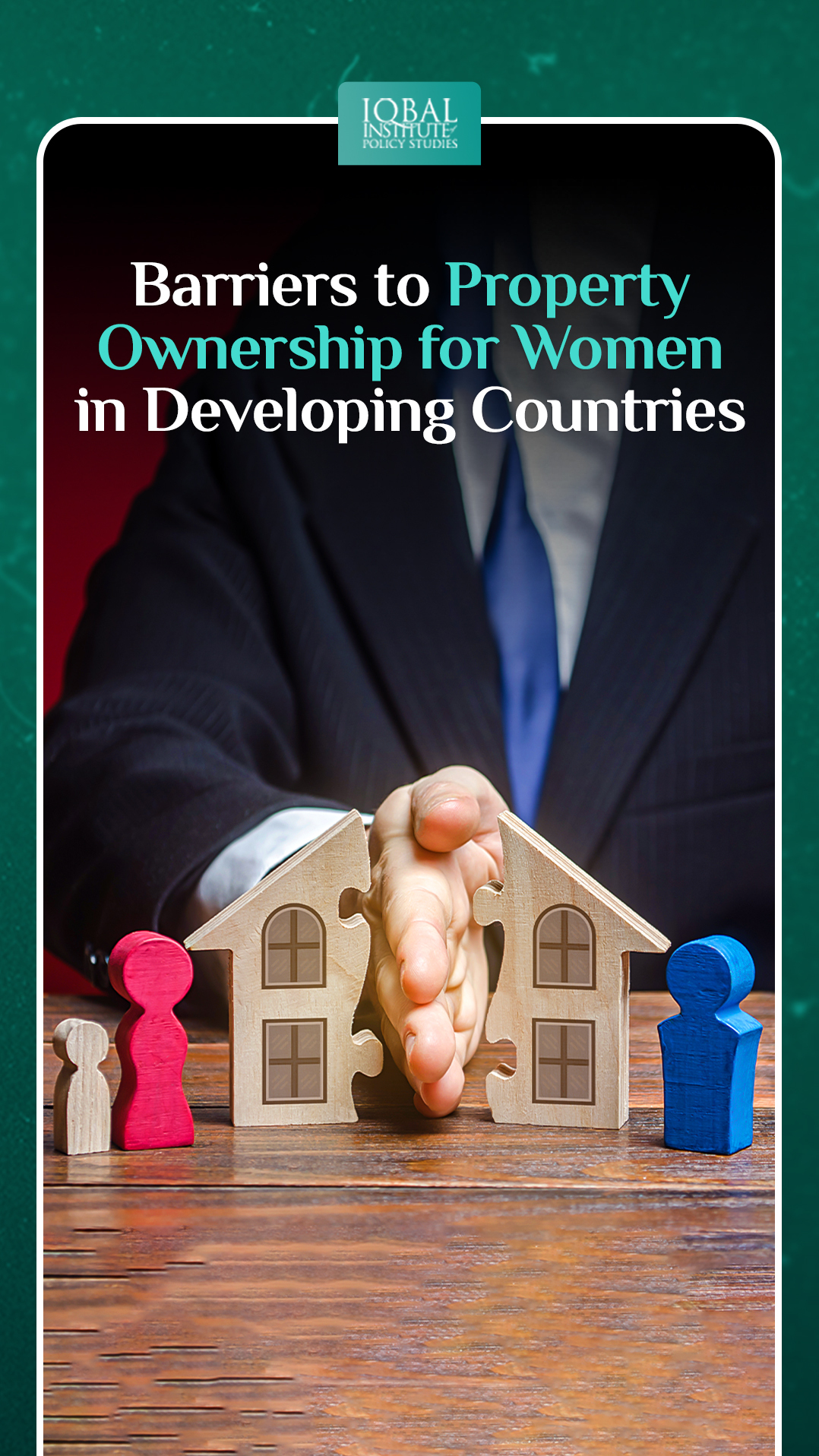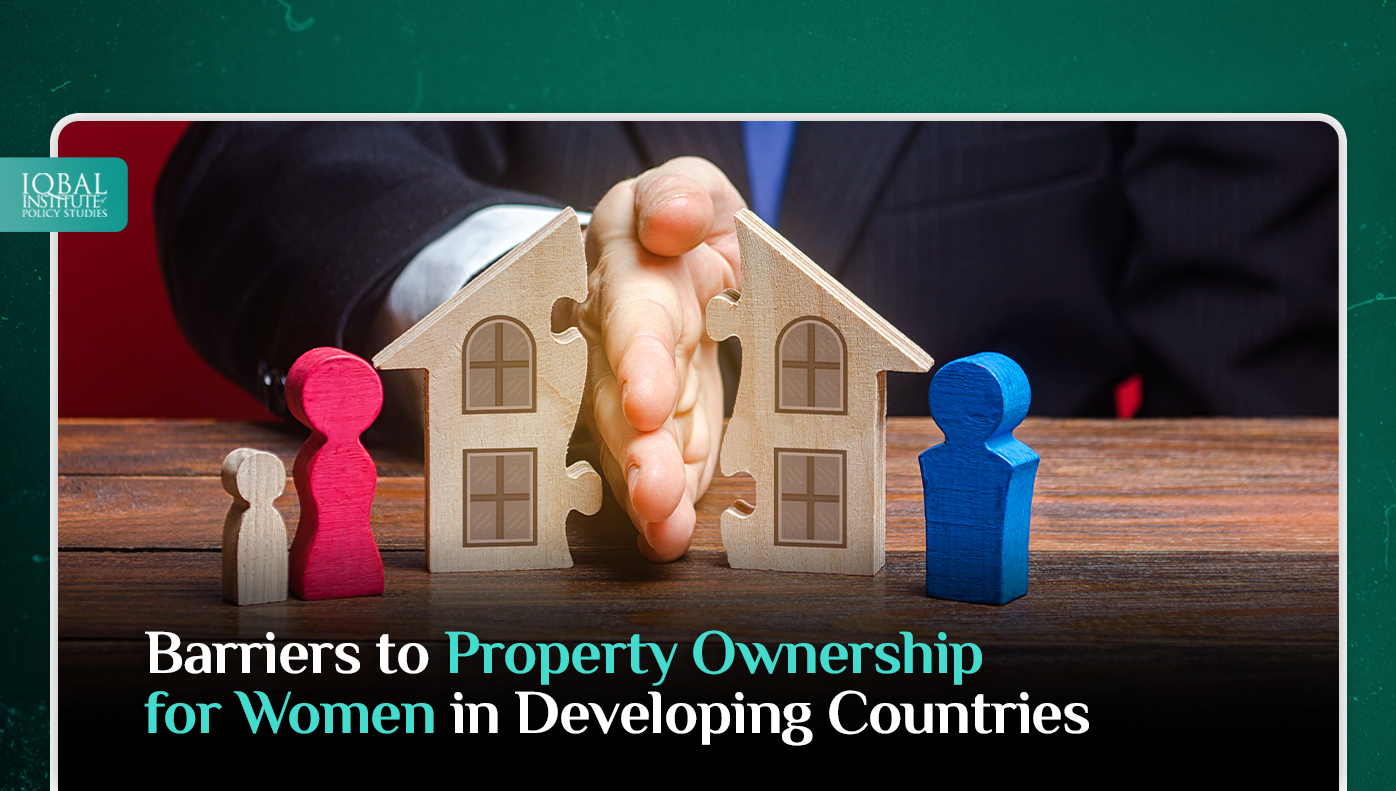Property ownership is crucial for empowerment and is correlated with the strength of local communities, social capital and political engagement. However, women in most developing countries are lagging in accessing housing and property rights, as these rights are intricately linked to male family members and marital status. Even in countries where laws are indiscriminating, cultural norms and execution and imposition of these laws can interfere with women’s ability to practice these rights and hinders housing accessibility. Moreover, there is a lack of systematic data on gender gaps in property ownership that would allow documenting these gaps. Gender discrimination in property ownership limits women’s ability to avail of various lucrative opportunities, such as credit from banks, as they do not support customers who lack traditional collateral such as land. Since owning land or property lessens economic uncertainty and vulnerability, it is crucial for both genders to avail this right equally. Equality in property ownership and inheritance is linked with greater female participation in social productivity and has the potential to impact the entire community.
Property Ownership Rights for Women in Pakistan
According to the world economic forum, women own less than 20% of the world’s land (World Economic Forum, 2017). Many Muslim countries’ constitutions and national laws guarantee equality and non-discrimination in property to all citizens regardless of gender. However, in Pakistan, women remain governed by families that discriminate against them in the name of tradition. Although the constitution of the Islamic Republic of Pakistan guarantees women’s rights to ownership (Abbasi, 2020), inheritance rights are usually violated by family members using coercion, fraud, fabrication, forgery, cheating etc. A woman who demands her inheritance is often labelled as greedy and considered dishonourable to the family by the country’s socio-cultural environment. Moreover, if women seek justice from the courts in this matter, they face familial condemnation and isolation followed by prolonged litigation. According to the Demographic and Health Survey 2017-18, 97% of women across Pakistan could not inherit land or house (Bacha, 2022). Moreover, the KP revenue department’s service delivery centre in Shangla recorded 30 incidents of tamleek which is the practice of gifting property to legal heirs during one’s lifetime. Of these 30 cases, only two cases considered daughters, while the rest set aside women (Bacha, 2022). In 2021, the Senate Standing Committee on Law and Justice rejected the constitutional bill which declared women’s inheritance a fundamental right (Wasim, 2021). This indicates a vast gap between what the law says and what happens in the name of culture and tradition. Since women’s property rights are key to economic development, the government must spread awareness campaigns and enforce constitutional laws that give women equal rights in inheritance and property.
What are the Barriers?
Difficulty in Passing Reforms
International Human rights committee has recognised and asserted women’s right to inheritance and property, and so have various countries’ national and constitutional laws. However, inheritance, property, and ownership reforms are difficult to pass, specifically in countries where cultural and social norms govern and dictate how assets are transferred to heirs. For example, Bangladesh legislation gives men and women the right to acquire and own property. However, the practice is limited by inheritance rules that are governed by Shariah Law, which places women and girls at a huge disadvantage (World Economic Forum, 2017).
Discriminatory Norms and Practices
Discriminatory social norms and practices are among the strongest barriers standing between women and their property rights. These are further aggravated by the weak implementation of policies, insufficient capacities to enforce laws, and a lack of political will. Also, discriminatory property laws result in poor well-being for women. Of the 190 economies, 76 limit women’s property rights, whereas, in 19 economies, women do not have equal ownership rights to immovable property. Moreover, in 34 countries, daughters do not have equal inheritance rights to sons; in 35 countries, widows are particularly vulnerable as they do not automatically inherit their dead husband’s property (World Economic Forum, 2017).
Lack of Recognition of Non-Monetary Contributions
Women’s lack of income during marriage impacts their economic independence and stability. As women are more engaged in unpaid household activities like a child or elder care, they have limited monetary contributions than men, thus acquiring few assets during the marriage. Lack of recognition of nonmonetary contributions during marriage dissolution or death of a husband deprives her of getting her fair share in marital property. Out of 75 countries with separation as the default marital property regime, only 28 have recognised non-monetary contributions (Almodóvar-Reteguis, 2019).
Patriarchal Values
Strong patriarchal values are considered a crucial barrier to women’s right over land ownership. Traditionally, inheritance has been patriarchal in which the ancestral property is passed through the male line and is rarely matrilineal. In most communities, there is male resistance to women’s land ownership. Moreover, men have the decision-making power and access to outside information, which overlooks women’s rights to property and ownership. This widens the gender gap between what the law provides and what is practised. For example, in Nepal, 37.6 per cent of women thought patriarchal values hindered women’s claim over their land ownership rights (Dhakal, Karki, & Gauchhan, 2016).
Lack of Trust
In backward areas where knowledge and literacy are limited, women are not trusted with land or financial responsibilities. Since women are limited to doing household chores and taking care of the family, they are not considered capable of handling property and dealing with land transactions. The mistrust and fear are also because of the belief that a woman might take away the land with her once she is married or may elope. For example, in Uganda, only 16% of the land is owned by Ugandan women, out of which only 7% of ownership is registered. Housing is considered a combined asset in rural areas and is mostly owned by men (Kes, Jacobs, & Namy, 2016).
The Way Forward
Land and property rights are fundamental human rights and can act as a powerful economic catalyst when given to women. To ensure equal property ownership and land rights for women, countries must consider the following points.
Effective implementation of reforms to establish a more gender-equitable legislative framework which ensures equal inheritance rights for both men and women in the legal ability to own a property and the legal treatment of spousal property can increase women’s property ownership.
Legal recognition of non-monetary contributions to marital property is crucial for women as it grants them access to a share of marital property upon the dissolution of marriage.
Community legal awareness and aid sessions, conducted across districts to educate individuals on their legal rights in their native languages and then given legal aid and advice through field advocates who take cases on their behalf or guide them through the process of a legal case is crucial to secure and guarantee women’s rights to property and ownership.
The government must take action against those who fraudulently transfer inherited properties to themselves and swindle the sisters of their shares. This can be achieved by creating a transparent regulatory authority system which overlooks the transfer of inheritance with accountability and credibility and ensures the security of women’s right to ownership of land or property.
Conclusion
Women’s property rights are significant for women’s empowerment and can lead to greater female labour force participation. However, legal, social and cultural barriers persist worldwide for women to access, own, and administer properties. This results in a wide gap in gender discrimination resulting in low social and economic productivity and contribution from women’s side. Therefore, countries must strengthen their policies and reforms to ensure the security and protection of women’s property and ownership rights. Equality in property rights for women can act as an important driver of economic growth and development, and when women are given economic opportunity, the whole world benefits.
References
Abbasi, M. J. (2020). The Enforcement of Women Property Rights Bills,2020. Senate Standing Comittee on Law and Justice . Retrieved from https://senate.gov.pk/uploads/documents/1582101895_441.pdf
Almodóvar-Reteguis, N. L. (2019, June 18). World Bank Blogs. Retrieved from https://blogs.worldbank.org/opendata/where-world-do-women-still-face-legal-barriers-own-and-administer-assets
Bacha, U. (2022, March 5). DAWN. Retrieved from https://www.dawn.com/news/1678231
Dhakal, S., Karki, K., & Gauchhan, M. (2016). BARRIERS TO WOMEN’S LAND AND PROPERTY ACCESS AND OWNERSHIP IN NEPAL. Retrieved from https://publications.iom.int/system/files/pdf/barriers_to_women.pdf
Kes, A., Jacobs, K., & Namy, S. (2016). Gender Land and Asset Survey Uganda. Retrieved from https://www.icrw.org/wp-content/uploads/2016/10/Gender-Land-and-Asset-Survey-Uganda.pdf
Wasim, A. (2021, November 4). DAWN. Retrieved from https://www.dawn.com/news/1655782
World Bank Group. (2022). Women, Business, and the Law. Retrieved from https://openknowledge.worldbank.org/bitstream/handle/10986/32639/9781464815324.pdf
World Economic Forum. (2017, January 11). Retrieved from https://www.weforum.org/agenda/2017/01/women-own-less-than-20-of-the-worlds-land-its-time-to-give-them-equal-property-rights/
World Economic Forum. (2017, January 11). Retrieved from https://www.weforum.org/agenda/2017/01/women-own-less-than-20-of-the-worlds-land-its-time-to-give-them-equal-property-rights/
This article is written by Haneen Gul. Haneen is a research analyst at the Iqbal Institute of Policy Studies.



Leave a Reply